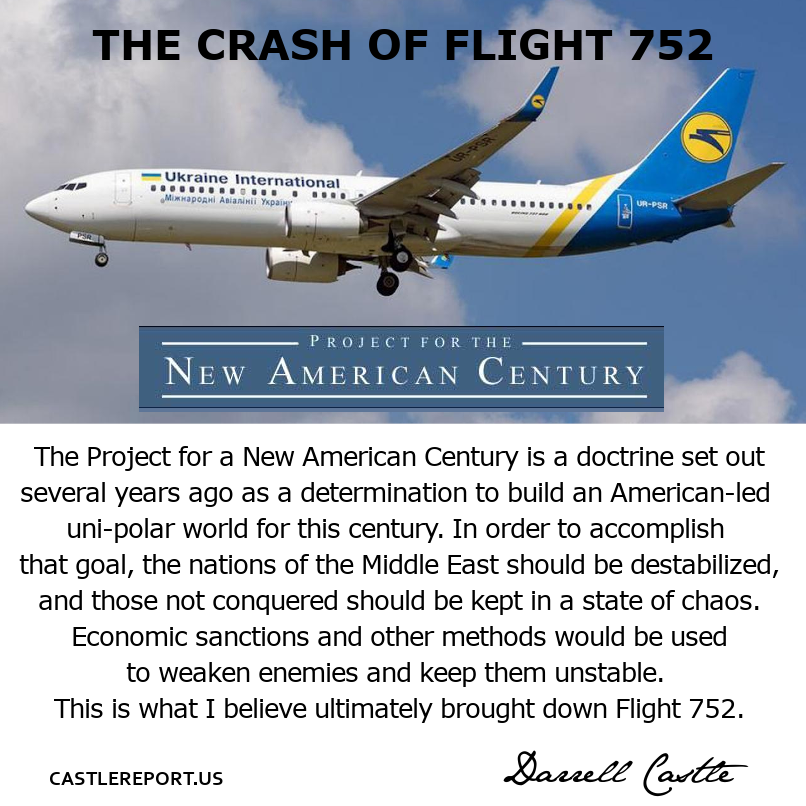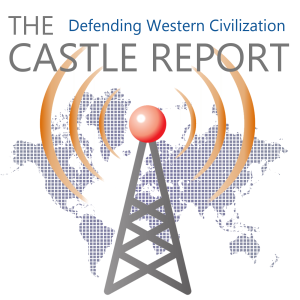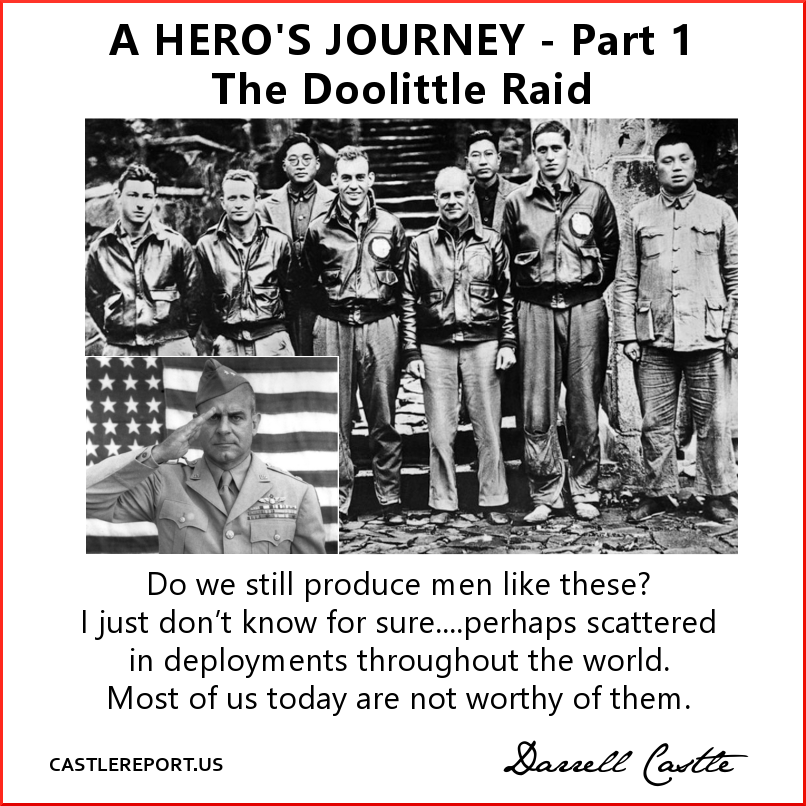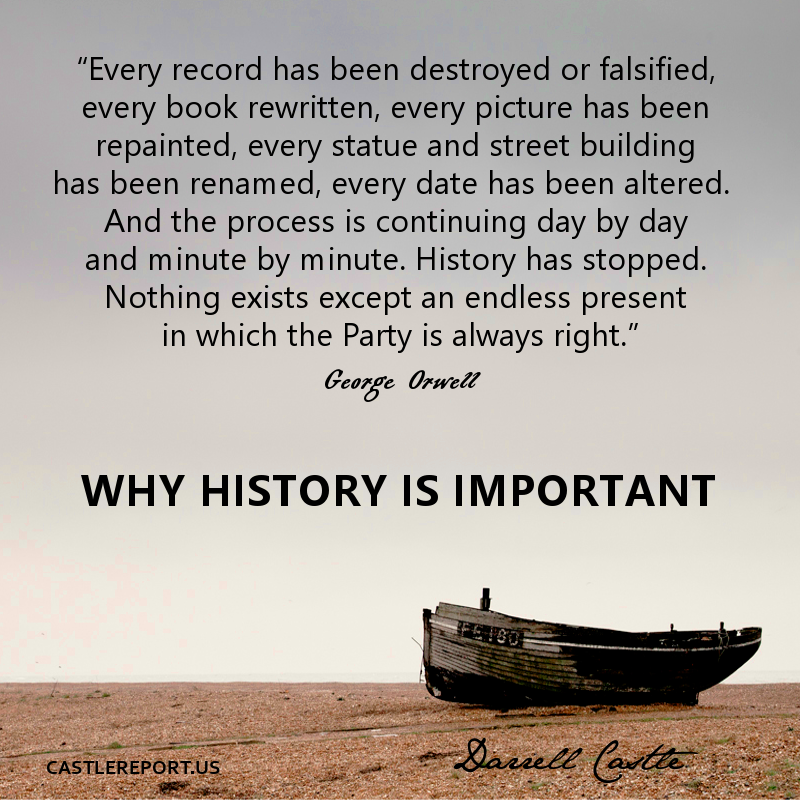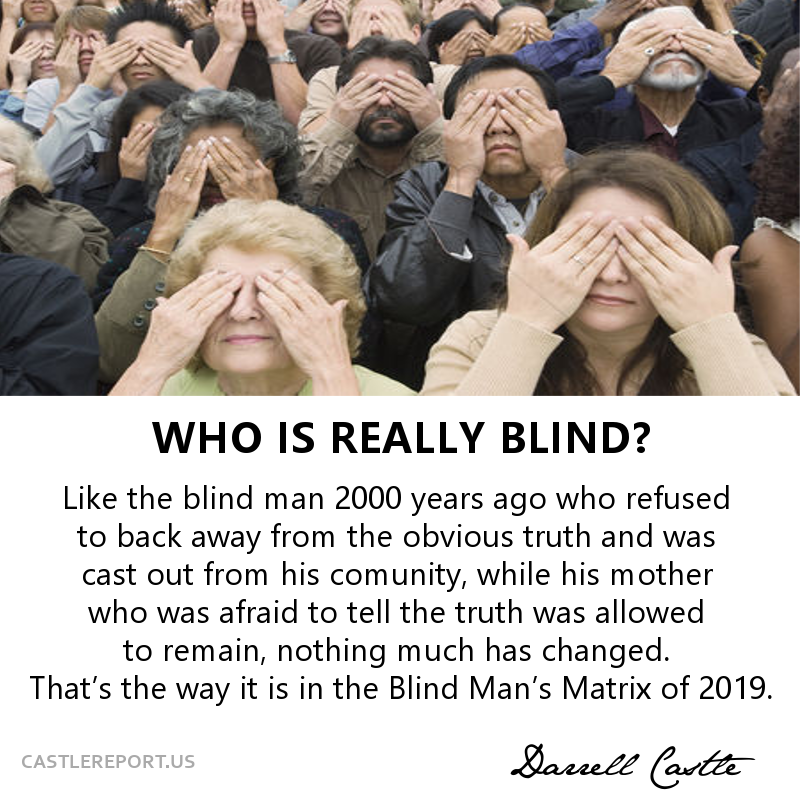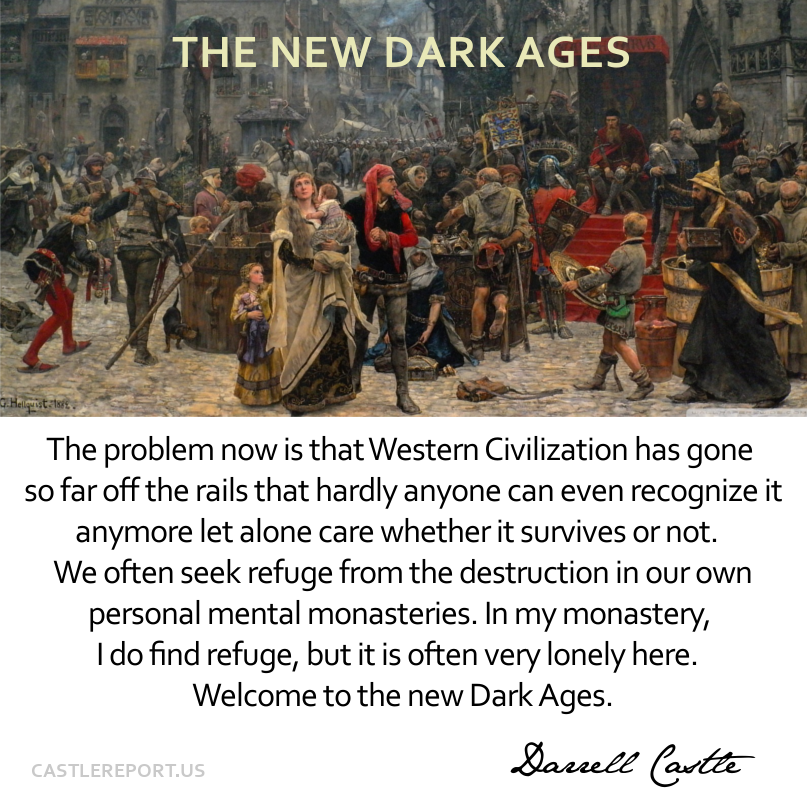World History
-
The Destruction of Cities
Podcast: Download
Darrell Castle talks about the 75th anniversary of the end of the war with Japan along with the current destruction of American cities.
Transcription/Notes:
THE DESTRUCTION OF CITIES
Hello this is Darrell Castle with today’s Castle Report. This is the 21st day of August in the year 2020 and here in the Castle family we are doing just fine except that the family daughter has had her hopes for an escape from her jungle island dashed again by a few cases of virus in New Zealand so flights have once again been cancelled. So, we talk to her on zoom, we wait, and we pray for her and her husband as they endure their 6th month of captivity.
Now here is a bit of information you might not be aware of. The destruction of the cities of the world has not always been the result of Democrat politicians although, by a strange coincidence, the two we are going to remember today were destroyed under a Democrat politician. This month of August 2020 is one of such historic importance that I must take you back 75 years into history to talk about it. Why do I remind you of World War Two anniversaries and talk about that event in history so much? Because the men who fought there should not be forgotten, and because it was the last time in our country’s history that we were completely united as a people against a common enemy.
-
The Crash of Flight 752
Podcast: Download
Darrell Castle talks about the crash of Ukrainian International Airlines Flight 752, as well as the desperate conditions inside Iran.
Transcript / Notes
THE CRASH OF FLIGHT 752
Hello, this is Darrell Castle with today’s Castle Report. Today is Friday, January 17, 2020, and today I will be talking about the crash, or more accurately, the shooting down, of Ukrainian International Airlines Flight 752. The flight took off from Tehran’s Imam Khomeini International Airport, and just about five minutes later, the Boeing 737-800 exploded in flight. No one argues about that, but what caused the explosion and crash, people do argue about.
Initially, the Iranian government claimed the crash was an accident due to engine failure, so the first reaction of the Iranian Regime was to lie. I suppose the lie was to avoid international criticism, but also perhaps because that’s just what governments do. The minute I heard about it I was certain of the cause. The Iranians shot it down by mistake and as an overreaction to fears of an American attack.
By week’s end the Regime admitted that the airliner was shot down by an Iranian air defense missile mistakenly fired due to “American adventurism”. The aircraft contained 82 Iranians, 63 Canadians, 11 Ukrainians, 10 Swedes, 4 Afghans, 3 British and 3 Germans, and there were no survivors.
Just a few hours before the crash, the Iranians had launched missile attacks from the area near the crash at bases containing U.S. troops in Iraq. Intelligence reports indicated that about 25% of the missiles failed to ignite or misfired in some other way. Usually in these types of attacks entire missiles are located when they fail to reach the target and fail to explode. That is what happened in the attack on Saudi Arabia’s oil fields earlier last year. That tells us that the hype about Iranian missile technology may be a bit exaggerated.
According to media speculation, growing pressure from Canadian Prime Minister Justin Trudeau, and from President Donald Trump, forced the Iranians to admit that they shot the aircraft down. Whether that was the reason or not, they did admit it, and fairly quickly, and furthermore they admitted to originally lying about the cause and they apologized for that.
So what really happened here, I mean why would the Iranian government would shoot down a defenseless airliner that was no threat to anyone? Speculation and guesswork are the only things we have, but I can think of a few possible reasons. The most plausible is the answer the regime gave, and that is, that it was a mistake due to a heightened alert status because of an expected American attack.
That answer seems plausible to me and makes logical sense. The Iranian armed forces had fired several missiles at American forces in Iraq, so they were obviously on high alert. They were quite forthright in their admission and their apology, which is unusual and unexpected. How could such a mistake happen? That’s an easy one to answer. Untrained or inexperienced launch officer or missile troops could have panicked when he or they saw the airplane on his or their tracking target radar. It could have been a mistake in command which released the weapons to fire without proper confirmation.
Remember a few years ago when the United States guided missile destroyer Vincennes accidentally shot down an Iranian airliner with 277 people on board? When tensions are high and threats are going back and forth you create a perfect environment for a fatal mistake.
Another possible answer is that the Iranians deliberately targeted someone, or some group of people, on the airliner and simply used the American dispute as cover. Perhaps there were several Canadians that they thought were espionage agents or were spying on their nuclear program in some way. That possibility seems rather remote to me and it doesn’t make as much sense as the simple mistake theory.
The final explanation didn’t surface until yesterday, at least that’s the first I heard of it, and that version is that an American Cyber attack caused the Iranian computers to lock on, track, and kill the airliner and everyone on board.
In any event it’s been a tough couple of weeks for the Iranians. They exchange bluster and then attacks with the Americans, and part of the bluster was the Ayatollah telling Donald Trump “there is not a damn thing you can do.” The Ayatollah learned an important lesson, and that is, that hellfire missiles carried on whisper silent drones are up there and they are watching anyone they want to watch.
Such a missile killed top Iranian General Soleimani at the Baghdad airport along with an important Iraqi. That attack led to a series of retaliatory strikes, and then what appeared to be a ceasefire or stand down agreement, but further attacks and threats led to a buildup show of force in the Gulf region by the Americans and British.
Dozens of B-52 bombers, B1 and B2 bombers along with the most advanced stealth fighter aircraft were sent to the region. The Persian Gulf and the Mediterranean were filled with warships to the extent that some were apparently close to colliding, as the Russians tried to intimidate American captains. Politicians in America, especially Democrats, were screaming World War III at the top of their lungs, and Nancy Pelosi even persuaded the House to pass a toothless, non-binding resolution restricting the President’s ability to attack Iran. None of them seemed to understand that his authority to make war on his own decision is already restricted by the Constitution.
Meanwhile, in Tehran and other Iranian cities, tens of thousands of people were in the streets risking their lives by screaming not death to America but “Death to the Dictator” and “Death to Liars” as well as “Khamenei is a Murderer.” The national unity that appeared briefly after the killing of General Qassim Soleimani disappeared as fast as it arrived.
Police, uniformed and plain clothed, as well as Iranian military, deployed in force to curtail the protests. They even arrested the British ambassador to Iran, Rob Macaire, and charged him as “an unknown foreigner in an illegal gathering”. Once his identity and status were confirmed they let him go but it is not a very safe time for non-Iranians to be out in the streets of Tehran.
The bad news got even worse, however, because at General Soleimani’s funeral at least 56 attendees were trampled to death and more than 200 injured. So it’s been a bad couple of weeks for the Iranians, and even before that, about a month ago some 1500 protesters were killed and many more arrested, so they have been under continuous pressure for some time. The severe economic sanctions imposed by the Trump Administration have left the regime with problems even supplying the population with enough food.
Middle East Eye reports Iranians on the street as saying “God has turned his back on us”. I don’t know why no positive thing occurs in Iran. We are frustrated by all the bad news we are hearing. Some people were quoted as saying they were “fed up” with living under sanctions and angered by the way the government has handled the problems. It’s interesting to me that the Iranian people seem to be blaming their own government for the sanctions rather that the government, which actually imposed the sanctions.
A report done by the website Numbeo, which monitors conditions in Iran, reported a growing dissatisfaction within the country due to economic stress. The average after tax wage is U.S. $318.53, so a monthly survival budget with basic food such as white rice and eggs, along with rent and utilities comes to $345.22 so it’s easy to see the cause of dissatisfaction.
According to official government data, food price inflation was 28% year on year at year end. Medicine is another problem as much of it cannot be found in pharmacies. Reduced consumption takes a toll on efforts to have a normal family life. According to the Tehran Times, the number of babies born in Iran fell by nearly 25% between 2015 and 2019. That is an unprecedented decline outside of wartime, especially since the number of women of child bearing age actually increased over the same time frame.
Iranians cannot sell their only valuable resource, oil, on the world market. Sanctions enforced by the U.S. Navy, have basically closed off the Persian Gulf to Iranians. Since no money of any consequence is available to the government, the government cannot provide food and medicine distribution which has led to desperate conditions inside Iran. Desperate conditions exist in Iran if you believe the reports coming out from various international agencies and the people are starting to rise up and express themselves even if it means risking their own lives.
Another problem the Iranian people face is water resources and what the Journal of Asian Affairs called government mismanagement of it. About 97% of the country is currently experiencing drought conditions. It is one of the worst water conditions among industrialized nations and it is forcing the abandonment of outlying villages as people move into the cities.
Not many nations have been willing to endure this level of deprivation without full war mobilization. I suppose war would be an excuse and a cover up for the mismanagement and misuse of the nation’s resources. The Iranian President, not the Supreme Leader, but the President Hassan Rouhani recently appeared on state run television to say the U.S. and especially E.U. troops in the Middle East are in danger and will be targeted. He used the word “insecure” to refer to them.
I wonder if he is suicidal himself or whether he is just willing to risk it for the people of his nation. The regime seems to be more unstable with each passing day and apparently that’s the way the U.S. President wants it. Why would the U.S. government want to see an unstable Iran? It’s anybody’s guess but I will give you three possible reasons:
1. The stories and accusations about Iran are true and it is the world’s terrorist center. General Soleimani needed to be killed because as American General Petraeus said, “he was responsible for providing explosives, projectiles, arms and other munitions that killed well over 600 of our soldiers.”
2. An unstable Iran helps Israel and keeps Israel’s most hated enemy from regaining strength and otherwise occupied.
3. The Project for a New American Century. The PFANAC is a doctrine set out several years ago as a determination to build an American headed uni-polar world for this century. In order to accomplish that goal, the nations of the Middle East should be destabilized and those not conquered should be kept in a state of chaos. Economic sanctions and other methods would be used to weaken enemies and keep them unstable.
Finally folks, choose one of these three or think of your own but as for me I’ll take the Project for a New American Century.
At least that’s the way I see it,
Until next time folks,
This is Darrell Castle,
Thanks for listening..
-
Mr. Gorbachev, Tear Down This Wall!
Podcast: Download
Darrell Castle talks about the 30th anniversary of the fall of the Berlin Wall and why it is still relevant today.
Transcription / Notes
-
A Hero’s Journey – Part 2
Podcast: Download
Darrell Castle continues with part two of A Hero’s Journey leading into Memorial Day.
Transcription / Notes
A HERO’S JOURNEY—PART TWO
Hello this is Darrell Castle with today’s Castle Report. Today is Friday May 24, 2019 the Friday before Memorial Day, just a three day weekend for most people but for us a chance to pause and remember. To that end we continue with part two of our Hero’s Journey to honor some of those who fought World War Two, and made that hero’s journey.
The early days of World War Two were desperate times for the naval and marine aviators trying to defend their ships from attack in the pacific. The only fighter aircraft they had for the first 15 months or so of the war was the F4F Wildcat which was vastly inferior to its main opponent the Japanese zero. The Wildcat did not have automatically retractable landing so the gear had to be manually retracted by the pilot turning a crank in the cockpit that operated a set of wheels and pulleys. It was less agile, less maneuverable, and slower than the Zero which all added up to a lot of dead American pilots.
The pilots used to joke about the Wildcat that it was so bad that when they launched from the deck of the Carrier the aircraft should immediately be reported as missing. One man named Jimmy Thach, decided that he would do something to change that. Lt. Com. Thach said that even though the aircraft was inferior to its Japanese counterpart, the men who flew them were not. He picked two other flyers from the squadron he commanded, and invited them to a training session in his quarters.
He took a few matchsticks and laid out for the other two pilots his tactical method. That method of changing tactics to accommodate the aircraft’s strengths and weaknesses redefined American fighter tactics and saved countless American lives as well as protected their ships from destruction. His theory was that since their aircraft were inferior to the enemy’s aircraft tactics had to change to even the score. His tactical change became known as the Thach weave whereby two Wildcats would weave back and forth in a kind of figure eight fashion thus making it almost impossible for a Zero to get on a Wildcat’s tail without exposing itself to attack from the other Wildcat.
The three of them went up and practiced the maneuver over and over until they had it down, and then they taught it to the rest of the squadron, and to the other squadrons on their ship, the USS Lexington. Jimmy Thach went on to become the best known tactician in the navy. He also developed what became known as the big blue blanket, to help protect ships from kamikaze attack later in the war.
Jimmy Thach was born in Pine Bluff Arkansas just across the river from where I live now. He did about everything a good hero can do during his journey. Throughout his forty years in the navy he was a theoretical innovator and a tactical genius. In the last year of the War he was a task force operations officer, and during the Korean War he was an aircraft carrier commander. During the cold war he contributed greatly to the navy’s anti-submarine warfare efforts. There is still an award for excellence named for him at the navy’s anti-submarine school.
He was also a great fighter pilot credited with many enemy aircraft, including six in one day. He served on the staff of Vice Admiral John McCain, that’s the senator’s father, and was aboard the USS Missouri in Tokyo Bay for the Japanese surrender. He was eventually promoted to four star rank and commanded the US naval operations in Europe. He retired from the navy in 1967 with 40 years of service. He died on April 15, 1981 four days before his 76th birthday thus completing his journey.
One of those men sitting at Jimmy Thach’s table to learn about the Thach weave was Edward “ Butch” O’Hare. You might recognize that name if you’ve ever flown into Chicago because O’Hare airport is named for Butch O’Hare although he was not from Chicago and never lived there. His father Edgar or EJ was a lawyer who had client who was Commissioner of the International Greyhound Racing Association. He hired EJ to apply for a patent on a mechanical rabbit device to be used in dog racing. EJ bought the rights from the client’s widow and took his rabbit to Chicago.
The man who ran Chicago then was Al Capone and he and EJ hit it off and were soon running all the tracks around Chicago. They also branched out into Boston and Miami and made huge amounts of money but the St. Valentine’s Day massacre in 1929 was pretty much the final straw for EJ. I suppose making money was good but cold blooded mass murder was bad. EJ apparently grew weary of working with thugs and gangsters so he turned over all of Capone’s financial records to the FBI and down went Capone for income tax evasion, and off he went to Alcatraz.
Butch had to live down EJ’s mob connection but EJ did finally put an end to Capone’s operation. Meanwhile, EJ had always been interested in flying so he got one of his politician friends to recommend Butch to the naval academy where he was determined become a naval aviator. While Butch was at the Academy EJ was driving home from his dog track in St. Louis in his new Lincoln when he was killed by a shotgun blast from a passing car.
Butch graduated from the Naval Academy and was accepted into aviation as a fighter pilot. The airplane he was trained on was the Wildcat that we just talked about. He had almost a year in the Wildcat before the war started so he became an aircraft gunnery expert through months of training. When war broke out he was assigned to the USS Lexington and to Jimmy Thach’s squadron.
Butch fought hard to defend the Lexington from Japanese attack but the older carriers were particularly vulnerable to attack from the air due to their wooden decks and to the sheer number of attacking aircraft. There is only so much fire that can be put up to stop a determined attack so the fighters have to do it, but if the attackers get through the outer fighter screen then for the fighters to continue their attack would mean exposure to friendly anti-aircraft fire.
Butch and his wingman were up on patrol over the Lexington one day when they were informed that a flight of 18 Japanese bombers from the Japanese base at Rabaul were inbound to the Lexington. The bombers were divided into two attack waves of nine each separated by a few minutes. They attacked the first wave and the two of them shot down six bombers and turned the rest around to join the incoming group. In the second wave Butch’s wingman’s guns would not fire so Butch fought the bombers alone all the way to anti-air range of the Lexington. When they reached that area there were six bombers left and Butch dove after them into his own friendly fire but not a single bomber reached the ship.
The captain of the Lexington recommended Butch for commendation for single handedly saving his aircraft carrier but Butch said no I don’t deserve a medal because every pilot on this ship would have done the same thing. The captain said maybe so but you actually did it so he recommended him for the Medal of Honor. President Roosevelt was in dire need of heroes at the time and Butch made a great one for the recruiting posters.
On March 4, 1942 Butch learned that he was front page news across the United States. Remember that in those years’ the front pages of newspapers were the news. The papers reported that President Roosevelt was going to award this handsome young aviator the Medal of Honor On April 21, 1942 Butch and his wife Rita came to the White House where he was awarded the Medal and promoted to Lt. Commander. He went back to St. Louis to a full military parade.
In June 1942 he returned to combat and took command of his old squadron. In November 1943 his squadron was assigned to the USS Enterprise because the Lexington was lost in the battle of the Coral Sea. The squadron now had the new F4F Hellcat which was more than a match for the zero. He was leading a mission supporting the Marine landings at Tarawa when he was shot down and killed. His death was apparently due to a series of mistakes by others but he was nevertheless dead.
In St. Louis his mother Selma saw a newspaper article that said that several Japanese planes had been shot down with the loss of only one American. That’s my Edward she said I know it is.
Paul Tibbets, a good friend of Butch’s since their high school days at Western Military Academy wrote his condolences to Butch’s mother. Paul became a pilot as well but in the air force or army air corps as it was called then. One and a half years after his friend and classmates death he flew a B-29 named for his mother, Enola Gay over Japan and introduced the world to the atomic age August 6, 1945.
All these men are dead now but I am glad to be able to remember them in this way, I have enjoyed bringing you their hero’s journeys. The next time you fly through O’Hare, think about how it got that name.
I could continue this series for the next year and not begin to tell all their stories but alas we must return to our modern world of identity politics. Theirs was a simpler time than ours. The war made everyone a patriot and at the same time it took away innocence and youth.
Next Friday then, God willing, we will return to the modern world of crises, terror, chaos and confusion.
At least that’s the way I see it,
Until next time folks,
This is Darrell Castle,
Thanks for listening.
-
A Hero’s Journey – Part 1
Podcast: Download
Darrell Castle pays tribute to the Tokyo Raiders and their leader, Lt. Col. Jimmy Doolittle and explains why it is important to remember them as we approach Memorial Day.
Transcript / Notes
-
Why History Is Important
Podcast: Download
Darrell Castle discusses why history is important and why so many seek to control and rewrite it.
Transcription / Notes
-
Who Is Really Blind
Podcast: Download
Darrell Castle talks about the Notre Dame Cathedral fire, the arrest of Julian Assange, and the Blind Man’s Matrix of 2019.
Transcription / Notes
-
Doughboys
Podcast: Download
Darrell Castle talks about the 100th anniversary of the end of World War I, and how that war still effects us today.
Transcription/Notes
-
The New Dark Ages
Podcast: Download
Darrell Castle talks about the rise of Western Civilization and the American ideal, and their descent into a New Dark Age.
-
Karl Marx – His 200th Birthday
Podcast: Download
Darrell Castle talks about the 200th birthday of Karl Marx and what Marxism has meant to the world and what it means to us today.
Transcript / Notes


